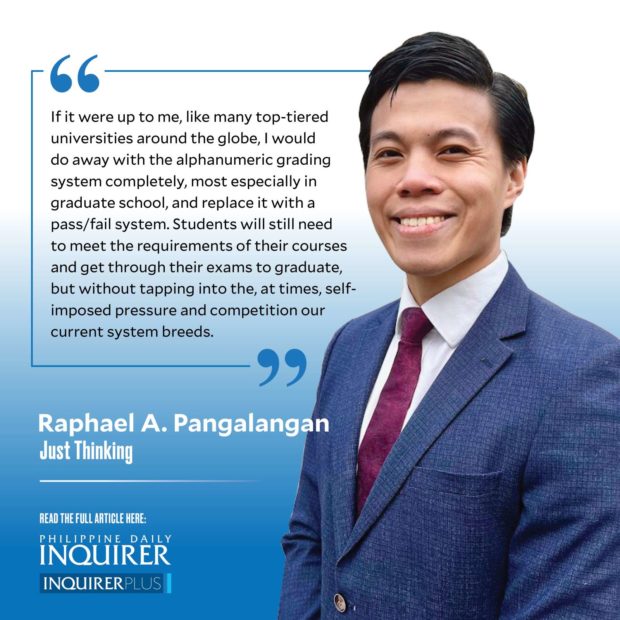Inflating grades, deflating egos
With the school year right around the corner, I would like to revisit a topic that has long piqued my interest but has long evaded my keyboard: the supposed “grade inflation” crisis.
It surprises me how the phenomenon’s extant is still put into question. If the unprecedented 1,433 Latin honor graduates of the University of the Philippines Diliman—a tenth of whom finished summa cum laude—is not enough evidence of the changing trends in grading, then perhaps we could look at the other end of the spectrum. For the past two years of COVID-19, UP has implemented a “no-fail policy.” This policy benefitted the subpar and the surpar performers alike. As observed elsewhere by Prof. Randy David, “the unavoidable consequence of [the no-fail policy] has been to push up the grades of the better performers.”
Article continues after this advertisementBut what is even more surprising than the debate over the existence of “grade inflation” is the butthurt that comes with it. Some students tend to take this unspeakable allegation quite personally, as if it were an attack on their merit or self-worth. They ought to be reminded that their value—may it be academically, professionally, and most importantly, personally speaking—is beyond appraisal. People are complex creatures that can be neither condensed nor celebrated through an alphanumeric. Further, they should keep in mind that personal successes are rarely ever the product of pure volition anyway. You could study 1,000 doctrines, but be asked to write on Doctrine No. 1,001 in your midterm exam. There is always an element of circumstance or darn luck somewhere along the way. And, lest we forget, justice is what the judge ate for breakfast.
In the students’ defense, the hyperinfatuation with grades has plagued Philippine society long before their time. Reinforcing Asian stereotypes, Filipinos unapologetically adore grades because they validate intelligence. But an A+ means so much more than just a test score. In the Philippines, it’s a personal valuation. Desperate for validation, we cling on to the academic measure as a social yardstick which, in turn, ascribes to us an identity. It’s as if Philippine life is your average teen movie where there are varsity jocks, bookworm nerds, and oddball rakistas, and, for some reason, everyone is racing for that penultimate role. We fail to realize that we need not choose between them in the first place. Even Stephen Hawking was a rower in his day and listened to Pink Floyd.
I recall my own student life in Malcolm Hall, where grade fixation sucked the air from its classrooms. It was suffocating, and I detested it and rejected it in my own little ways. And I admit, my marks showed it. But much like our personal value, I firmly believed and continue to believe that intelligence could not be measured on a single scale. I showed my worth elsewhere through moot court competitions and essay publications.
Article continues after this advertisementIt was only when I pursued graduate studies that I decided to focus more closely on my textbooks. But unlike my experience in UP Law, my academic rigor was not fueled by examination results or batch ranks, but by sheer scholarly interest. Yet still, I finished with distinction and with honors. This only goes to show that where genuine academic interest comes first, grades may very well soon follow. I don’t recall ever caring about grades let alone talking about them at either end of OxBridge; but I do remember the raised eyebrows elicited when someone else did in the dining hall.
If it were up to me, like many top-tiered universities around the globe, I would do away with the alphanumeric grading system completely, most especially in graduate school, and replace it with a pass/fail system. Students will still need to meet the requirements of their courses and get through their exams to graduate, but without tapping into the, at times, self-imposed pressure and competition our current system breeds. Perhaps in so doing, we would afford students the breathing space to not only develop what they are horribly bad at but discover what they just might be tremendously good at.
On several occasions, I’ve been approached to share my views on grade inflation. My answer has always been twofold: Though I think it’s real, I don’t really care for it much. At the core of that sentiment is the fact that, when it comes down to it, I guess I never did quite care about grades at all!
——————
thinkjustly@gmail.com
For more news about the novel coronavirus click here.
What you need to know about Coronavirus.
For more information on COVID-19, call the DOH Hotline: (02) 86517800 local 1149/1150.
The Inquirer Foundation supports our healthcare frontliners and is still accepting cash donations to be deposited at Banco de Oro (BDO) current account #007960018860 or donate through PayMaya using this link.

















